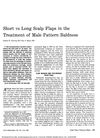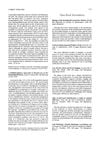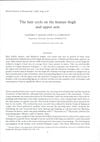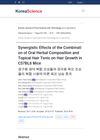 126 citations,
April 2015 in “Clinical, cosmetic and investigational dermatology”
126 citations,
April 2015 in “Clinical, cosmetic and investigational dermatology” Choosing the right patients, using proper techniques, and having thorough knowledge are key to preventing and managing dermal filler complications.
 15 citations,
November 2019 in “Cutaneous and Ocular Toxicology”
15 citations,
November 2019 in “Cutaneous and Ocular Toxicology” Minoxidil tretinoin liposomal based hydrogel shows promise for effective treatment of hair loss by delivering both drugs at the same time.
 July 2003 in “Journal of Cutaneous Medicine and Surgery”
July 2003 in “Journal of Cutaneous Medicine and Surgery” Skin problems are common in Bangladesh due to arsenic, prompt treatment of diabetic foot ulcers is crucial, maternal transmission causes most neonatal herpes, treatments for pediatric vasculitis are effective, the chickenpox vaccine works, more frequent UVB therapy helps psoriasis, certain jobs increase hand dermatitis risk, monoclonal antibodies treat psoriasis well, lifestyle affects psoriasis, alefacept improves psoriasis, imiquimod cream partially clears basal cell carcinoma, and iron may not help chronic hair loss.
 4 citations,
June 2013 in “The Journal of Rheumatology”
4 citations,
June 2013 in “The Journal of Rheumatology” The document concludes that various findings in rheumatology offer insights into disease severity, treatment responses, and potential risks in medication, with some limitations due to unspecified participant numbers.
 129 citations,
November 2005 in “Internal Medicine Journal”
129 citations,
November 2005 in “Internal Medicine Journal” Early detection and intensive treatment of diseases caused by Staphylococcus aureus toxins are crucial for reducing severe health effects.
 45 citations,
July 2002 in “The Neurologist”
45 citations,
July 2002 in “The Neurologist” A comprehensive approach to educating patients and managing side effects is crucial for improving adherence to multiple sclerosis treatments and patient quality of life.
 21 citations,
February 2012 in “Journal of the European Academy of Dermatology and Venereology”
21 citations,
February 2012 in “Journal of the European Academy of Dermatology and Venereology” Late-onset alopecia areata in Taiwanese patients is more common in women, usually starts at age 57, often involves less than 10% hair loss, and may have a minimal link to thyroid issues.
 1 citations,
December 2017 in “The journal of investigative dermatology. Symposium proceedings/The Journal of investigative dermatology symposium proceedings”
1 citations,
December 2017 in “The journal of investigative dermatology. Symposium proceedings/The Journal of investigative dermatology symposium proceedings” Treating alopecia areata is difficult due to limited approved treatments, but new therapies like JAK inhibitors show promise.
 48 citations,
October 2011 in “Sports Medicine”
48 citations,
October 2011 in “Sports Medicine” Ice-skating athletes often have skin problems due to cold, infections, and inflammation, needing careful treatment and prevention.
 10 citations,
July 1981 in “Archives of Otolaryngology-head & Neck Surgery”
10 citations,
July 1981 in “Archives of Otolaryngology-head & Neck Surgery” Short scalp flaps are easier but not good for severe baldness; Juri flaps are complex but better for density and coverage.
 1 citations,
November 2022 in “Anais Brasileiros de Dermatologia”
1 citations,
November 2022 in “Anais Brasileiros de Dermatologia” Many hospitalized children with COVID-19 had skin, mouth, or nail changes, with skin rashes being common.
6 citations,
January 2019 in “Journal of feline medicine and surgery open reports” A cat with severe skin issues improved with dexamethasone and cetirizine.
 59 citations,
January 2002 in “Dermatology”
59 citations,
January 2002 in “Dermatology” A new type of sudden, complete female hair loss was found, with most patients fully recovering within 6 months without needing steroid treatment.
 November 2015 in “Springer eBooks”
November 2015 in “Springer eBooks” Hair loss treated with minoxidil, finasteride, laser/light, hair transplant, and scalp prostheses; more research needed for skin of color.
1 citations,
March 2021 in “CRC Press eBooks” Oral minoxidil may be a better treatment for hair loss than topical minoxidil.
 6 citations,
October 1993 in “The journal of the Royal Society of Health”
6 citations,
October 1993 in “The journal of the Royal Society of Health” Children's hair loss has many causes and requires careful diagnosis and personalized treatment, including emotional support.
 53 citations,
October 1993 in “Drug Safety”
53 citations,
October 1993 in “Drug Safety” Oral retinoids can cause side effects ranging from mild to severe, including birth defects, and require careful monitoring and contraception.
 117 citations,
March 2013 in “Journal of the European Academy of Dermatology and Venereology”
117 citations,
March 2013 in “Journal of the European Academy of Dermatology and Venereology” No effective treatment for frontal fibrosing alopecia was found, but oral 5-alpha-reductase inhibitors had the best response; for lichen planopilaris, topical corticosteroids were commonly used but had a high relapse rate.
 1 citations,
May 1999 in “Journal of Oral and Maxillofacial Surgery”
1 citations,
May 1999 in “Journal of Oral and Maxillofacial Surgery” Patients with mandible reconstruction had better quality of life and function than those with soft-tissue reconstruction.
 3 citations,
January 2016 in “Skin appendage disorders”
3 citations,
January 2016 in “Skin appendage disorders” Possible causes of female hair loss include androgenetic alopecia, telogen effluvium, cicatricial alopecia, and alopecia areata incognita; diagnosis and treatment require dermoscopy and histopathology.
 67 citations,
July 1985 in “British journal of dermatology/British journal of dermatology, Supplement”
67 citations,
July 1985 in “British journal of dermatology/British journal of dermatology, Supplement” Men's thigh hair grows longer and has a longer growth cycle than women's, but arm hair growth is similar between genders.
22 citations,
December 1992 in “The journal of pediatrics/The Journal of pediatrics” Zinc supplements improved hair and skin conditions in two patients.
 5 citations,
March 2014 in “Journal of The American Academy of Dermatology”
5 citations,
March 2014 in “Journal of The American Academy of Dermatology” The study suggests hormonal factors may play a role in Frontal Fibrosing Alopecia and that treatments like oral antiandrogens and steroids could be beneficial.
 41 citations,
September 2007 in “Pediatric emergency care”
41 citations,
September 2007 in “Pediatric emergency care” Oral medication is necessary to treat scalp fungus in children, with griseofulvin being the usual choice.
 5 citations,
January 1987 in “Gynecologic and obstetric investigation”
5 citations,
January 1987 in “Gynecologic and obstetric investigation” Cyproterone acetate implants were more effective at reducing facial hair and improving skin in severe hirsutism than oral treatment.
 July 2007 in “DOAJ (DOAJ: Directory of Open Access Journals)”
July 2007 in “DOAJ (DOAJ: Directory of Open Access Journals)” Female pattern hair loss, common in women, can be treated with oral antiandrogens and topical minoxidil, but these are more effective at preventing further loss than regrowing hair. Other helpful methods include counseling, cosmetic camouflage, and hair transplantation. Treatment must continue for effects to last and it may take up to 2 years to see results.
 1 citations,
April 2012 in “Korean Journal of Food Science and Technology”
1 citations,
April 2012 in “Korean Journal of Food Science and Technology” Using both oral herbal supplements and hair tonic together works better for hair growth than using just the tonic.
 4 citations,
August 2013 in “Expert Review of Dermatology”
4 citations,
August 2013 in “Expert Review of Dermatology” Updated treatments for female hair loss include minoxidil, antiandrogens, hair transplants, and light therapy.

Combining oral and topical treatments improves hair growth more than using either alone.

Different hair and nail conditions can indicate health issues and have specific treatments; accurate diagnosis is crucial before treatment.


























